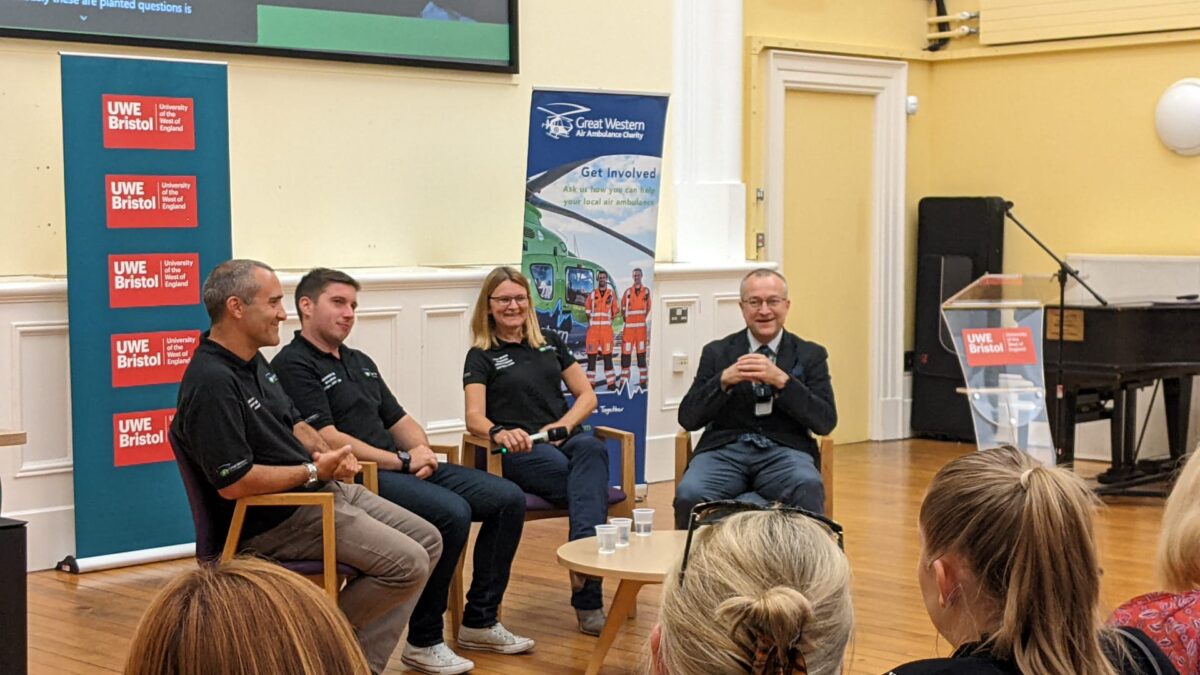
Flying High: Success for GWAAC at Charity Super.Mkt
September 26, 2023
Meet our new GWAAC Operations Officer, Tim Ross-Smith
October 9, 2023On 28 June, members of Great Western Air Ambulance Charity (GWAAC) crew joined the University of the West of England (UWE) for its Bristol Distinguished Address Series (BDAS).
BDAS events provide an opportunity to hear unique perspectives and insights from change-makers, activists, entrepreneurs, and people who have achieved amazing things in Bristol and beyond.
Keynote speaker, Advanced Clinical Practitioner in Critical Care (ACP-CC), Vicki Brown addressed an audience of around 100 student paramedics and GWAAC supporters. Vicki shared her journey into paramedicine and how she got to where she is today. She held the audience captivated by how she is pushing boundaries within the paramedic profession.
Attendees also learned:
- How they can get involved with the Great Western Hearts initiative and become a volunteer
- How the impact of GWAAC’s Critical Care Team can mean the difference between life and death with survivor stories
- How they can pursue a career in paramedicine in Helicopter Emergency Medical Services (HEMS)
- CPR and how to use a defibrillator as demonstrated by Heartstarters volunteers and the GWAAC crew
Vicki’s keynote speech, an engaging panel discussion, and a Q&A session at the end inspired many budding paramedics. Read on to learn more.
18:00 Doors opened
On arrival at UWE’s Glenside Campus, attendees enjoyed refreshments and a chat with the GWAAC crew and volunteers.
18:30 Welcome & Introduction
One of GWAAC’s founding doctors, Professor Jonathan Benger, opened the event with a warm welcome, an outline of what to expect, and: “Vicki is our highlight of the evening.” No pressure, Vicki!
First up – paramedic student, Ellie
Following Professor Benger’s introduction, Ellie, a second-year paramedic student and President of the Heartstarters Society at UWE Bristol, took to the stage. In a three-minute slot, Ellie eloquently and passionately spoke about her experience as a Great Western Hearts Heartstarters volunteer and why she set up the Heartstarters Society at UWE Bristol.
Ellie said, “I encourage anyone here today with a background in CPR to volunteer as a Great Western Heartstarter.”
Clearly passionate about saving lives and being a student paramedic, Ellie told the audience that before she started her course at UWE, she’d read about Vicki as an Advanced Clinical Practitioner in Critical Care. She said, “It’s a true inspiration and a privilege to be standing here now, on the same stage.”
Patient video leaves audience silent
Next up was a patient video that packed a powerful message into a four-minute slot; Jasmine’s story didn’t leave a dry eye in the lecture hall and it did a wonderful job of showing the positive impact that GWAAC’s crew can have on a family.
And while the audience contemplated the skills and expertise of GWAAC’s crew, Professor Benger introduced Vicki. He described her as, “The most clinically qualified paramedic in the country who has pioneered clinical leadership for paramedics.” He finished with, “We’re very proud.”
“Jasmine’s video reminds us of why we do what we do”
These were Vicki’s opening words to her twenty-five-minute keynote speech — a speech that could have held the audience captivated all day.
Vicki ran through her journey into paramedicine and how she got to where she is today. The audience learned how she started life as a pony-mad teenager, moving into a career with horses. But on a quest “to earn a bit more money” she looked at a paramedic job advert that was handed to her by a friend. She joined Gloucestershire Ambulance Service in 2004 and hasn’t looked back since.
In 2006 she was seconded part-time to the County Air Ambulance and achieved a postgraduate certificate in critical care. She worked for the air ambulance while still working on the ambulances. In 2012 she moved to GWAAC and in 2020 she became an ACP-CC.
Moving on to more recent career advancements, Vicki spoke about becoming an ACP-CC, how the profession is moving forward, and how she is currently writing a training programme for a three-year pathway. You can listen to Vicki talking about her career in the Pre-hospital Podcast.
“The benefit of qualifying as an ACP,” Vicki said, is the “high degree of autonomy you have and complex decision-making you can bring to a scene.” Vicki can also do certain procedures without a doctor present such as a thoracotomy and amputation.
Vicki then shared what she does at GWAAC; as Clinical Lead, she has a role in the governance of GWAAC and is the link to the ambulance service. She ensures GWAAC adheres to governance by South Western Ambulance Service NHS Foundation Trust (SWASfT) and follows SWASfT policies.
“As a senior clinician, I can help guide the team for the benefit of our patients. I am involved in the selection process at GWAAC, and with staff wellbeing. I particularly enjoy making sure the right support is in place for those who want to develop their own ideas.”
Wearing many hats, Vicki is also involved in research, innovation, equipment, courses and funding, and clinical audits. All this while working eight to ten shifts a month and spending time in hospitals:
“I’m always learning, always gaining knowledge. That never stops!”
Vicki advised the students in the room, “Case discussions were how I did a lot of my learning in the early days with GWAAC. Listen to others, hear how they dealt with things and think about how you would deal with it.”
Vicki explained that her path to FPHC level 8 was long and tough. She is now helping to develop and design a route for other practitioners to follow and to standardise what the ACP-CC role is.
Looking to the future, she believes that practitioner-led pre-hospital emergency anaesthesia is achievable.
She finished with a quote from T.S. Eliot:
“If you do not push the boundaries, you will never know where they are.”
Speaker panel
Vicki, Professor Benger, Critical Care Doctor Rich Jeavons, and Specialist Paramedic in Critical Care (SPCC) Callum Sutton then took their seats for a panel discussion.
Professor Benger led the discussion and the panel spoke about what it’s like to work in HEMS, the various roles, and what GWAAC and UWE and others have achieved together to date. They moved on to the vision for the future.
They discussed the importance of the doctor and paramedic approach at GWAAC. Dr Rich said, “Each brings different skills to the party.”
And they discussed the sustainability of the future of paramedics and how Vicki was setting great foundations so boundaries can be pushed over the next ten years.
When asked what her advice would be to student paramedics, Vicki said, “Take your time. Gain as much experience as you can and enjoy the paramedic pathway. You need experience to work through the levels.”
Dr Rich was asked what it will be like working for GWAAC in ten years’ time. He replied, “I started in 2017 and it’s already progressed – more kit and more procedures. I’d like to see a smooth pathway from incident to hospital and out the other side. And I’d like to see the right care delivered by the right person regardless of the titles. The kit will inevitably change.”
Audience Q&As
The audience asked what should change for paramedics in the future? Professor Benger replied, “There is a challenge around retention. Being a paramedic used to be a job for life. But we’re losing all the training and enthusiasm.” SPCC Callum agreed and said, “It’s about creating more opportunities within the profession.”
More questions followed around paramedics being hungry to do more and does Vicki foresee a day when they’ll get nearer to Doctor titles? Vicki replied, “It’s very different training. I can see the term “consultant” coming in somewhere, but we won’t be doctors. It’s a very different skillset, although some skills overlap.”
Callum emphasized, “We should be proud of being paramedics. Paramedics can be better at managing a scene. It takes a doctor time to be comfortable managing a pre-hospital scene after coming out of the hospital environment.”
The questions then moved on to how they cope with the appreciation that comes their way from families of loved ones and the patients themselves. Callum said, “It’s hard because what we do is relieve the suffering, not always in big ways, but sometimes in small ways – a hand on a shoulder – we can make a small difference to someone in a moment of time.“
And how do they handle the emotions that come with the job, such as the grief of families if they lose a loved one? Vicki said, “We all have our different ways of dealing with things, our own coping strategies, and we get good support from each other and GWAAC has a good welfare strategy in place, and at South Western Ambulance Service Foundation Trust. It’s not always the big jobs that get you. It can be something very minor that tips you over the edge.”
At the end of the Q&A session, Professor Benger thanked everyone for coming and acknowledged the hard work of the charity staff and volunteers for making it all possible.
19:30 Post-talk networking
At the end of the night, the Heartstarters volunteers demoed CPR to small groups, and individuals and attendees had a chance to speak with the crew and learn more from staff and volunteers about the charity, fundraising and volunteering opportunities.
It’s over to the attendees…
“I wanted to come because I’m hoping to join GWAAC as one of their clinicians. But I know it’s a tough nut to crack. I did an observer shift with SPCC Callum a few months ago. The whole unit was very interested in investing time with me. My biggest learning from the night is that I genuinely, despite a decade in the ambulance service, didn’t realise quite what Vicki had achieved in terms of her qualifications and the boundaries she has pushed; I knew she’d climbed a mountain but didn’t realise quite how far up she’d climbed!”
Henry, SWASfT.
“It was good to learn the difference between paramedics and Specialist and Advanced Paramedics.”
Aryan and Dhavit, Bath University Students
“We came because we support GWAAC on Facebook and were interested to learn more about the charity and see if we could support in other ways apart from donations. We were fascinated to hear about the paramedics’ career paths, structure, and what they can do.”
Linda and Alan, GWAAC supporters
Thank you!
The evening was only made possible thanks to our wonderful volunteers who helped set up, sell GWAAC goods, demo CPR and defib use, raise awareness of GWAAC, and generally make attendees feel very welcome. Thank you very much!
If you want to learn more about Vicki’s journey, click here.

An audience awaits GWAAC's speakers

Guests mingle and learn CPR at UWE's Glenside Campus

Vicki gives her keynote speech

ACP-CC Vicki Brown in her GWAAC orange
As a senior clinician, I can help guide the team for the benefit of our patients. I am involved in the selection process at GWAAC, and with staff wellbeing. I particularly enjoy making sure the right support is in place for those who want to develop their own ideas.

GWAAC's speaker panel
Take your time. Gain as much experience as you can and enjoy the paramedic pathway. You need experience to work through the levels.



